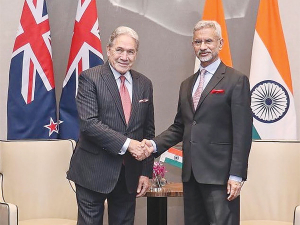New Order
OPINION: If old Winston Peters thinks building trade relations with new nations, such as India, isn't a necessary investment in our future, he has rocks in his head.
 Foreign Affairs Minister Winston Peters meeting his Indian counterpart Subrahmanyam Jaishankar during a visit to New Delhi.
Foreign Affairs Minister Winston Peters meeting his Indian counterpart Subrahmanyam Jaishankar during a visit to New Delhi.
This past week has seen another round of negotiations between India and New Zealand to produce a free trade agreement (FTA) between the two countries.
A team of NZ officials from several government departments, led by the Ministry of Foreign Affairs and Trade (MFAT), have been in Delhi for talks with their Indian counterparts. These talks are between officials only and no politicians have been involved in the negotiations.
This latest round of talks is part of the ongoing process to reach agreement on an FTA. Every month there are four or five days of 'virtual' negotiations, followed up by face-to-face meetings between the two parties.
The FTA consists of 19 chapters or separate parts and is identical in structure to other FTAs that NZ has secured. The focus ranges from issues around rules, phytosanitary standards, a chapter on composition, services and, of course, trade.
While NZ is pressing for dairy to be included in the FTA, the chances of this are nil, and we are not being singled out in this regard. Britain and Australia, who have FTAs with India, also had dairy excluded from their respective agreements.
A couple of issues on the trade side that NZ is pushing hard on are apples and honey. Currently, India imposes a 50% tariff on apples which limits our ability to access that market. While India does produce apples, they are of course seasonal and what the NZ negotiators are trying to do is convince the Indians to allow NZ fruit in only when the local supply dries up.
The NZ position is that having apples on the market for 12 months of the year ensures that consumers have continuous supply which makes good marketing sense.
What NZ is saying is we will fill that gap in local supply and be gone when Indian fruit come on the market. This is an argument that we have successfully pursued with other primary products in the Northern Hemisphere.
The other issue is honey, and NZ is again trying to get access for manuka honey which has a high price point, well above the local produce.
The FTA with India is seen as a high priority for our government and it's proceeding at pace. The stakes are high. Over the past couple of weeks, NZ will have had about 15 people in Delhi at various stages of this latest round of talks. It's believed India will likely have double that number of people.
At the same time, the political tempo is being kept up with Trade Minister Todd McClay making regular trips to India along with Prime Minister Christopher Luxon there in March and Foreign Minister Winston Peters there some weeks ago.
Donald Trump's latest tariff tantrum has again thrown the world of trade into a new round of turmoil and uncertainty, and NZ is caught up in it.
The third edition of the NZ Dairy Expo, held in mid-February in Matamata, has shown that the KISS principle (keep it simple stupid) was getting a positive response from exhibitors and visitors alike.
Twenty years ago, South African dairy farm manager Louis Vandenberg was sent to a farm in Waikato to provide training on Afimilk technology.
Strong farmgate milk price is helping boost investment on farms, says PGG Wrightson chief executive Stephen Guerin.
Fonterra's 460 milk suppliers in Australia, who will switch to Lactalis end of this month, are unfazed with the impending change.
The 5+ A Day Charitable Trust has launched a collection of affordable recipes designed to turn everyday vegetables into seasonal stars.
OPINION: Is it a case of over promising and under delivering? Farmers think so.
OPINION: The UK dairy industry is celebrating a win after plant-based drink maker Oatly lost a long-running legal battle over…